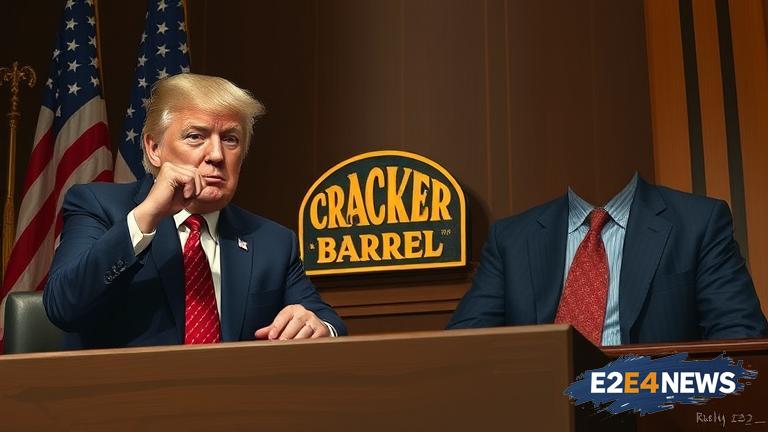The recent rebranding efforts of Cracker Barrel, a popular American restaurant chain, have been met with widespread criticism and outrage. Former President Donald Trump has now weighed in on the controversy, offering his blunt advice to the company. Trump, known for his straightforward and often divisive comments, has suggested that Cracker Barrel should revert to its original branding and focus on its traditional values. The rebrand, which aimed to modernize the company’s image and appeal to a wider audience, has been seen as a departure from the chain’s Southern roots and heritage. Many customers have taken to social media to express their disappointment and frustration with the changes, with some even calling for a boycott of the restaurant. Trump’s comments have been met with a mix of reactions, with some praising his honesty and others criticizing his involvement in the matter. The controversy has sparked a wider debate about the importance of branding and the impact of rebranding efforts on customer loyalty. Cracker Barrel has faced significant backlash on social media, with many customers expressing their discontent with the new logo and marketing strategy. The company has attempted to address the concerns, stating that the rebrand is intended to appeal to a new generation of customers while still maintaining its traditional values. However, the efforts have been met with skepticism, and the company’s stock has taken a hit as a result. Trump’s advice to Cracker Barrel is not the first time he has weighed in on a business controversy, and his comments are likely to be seen as a reflection of his own business philosophy. The former President has a history of speaking his mind and offering his opinions on a wide range of topics, often sparking controversy and debate. In this case, his comments have added fuel to the fire, with many calling for Cracker Barrel to take his advice and revert to its original branding. The controversy has also raised questions about the role of social media in shaping public opinion and the impact of customer feedback on business decisions. As the debate continues, it remains to be seen how Cracker Barrel will respond to the criticism and whether the company will ultimately decide to revert to its original branding. The situation has also sparked a wider discussion about the importance of listening to customer feedback and the potential consequences of ignoring it. In the age of social media, companies are under increasing pressure to respond to customer concerns and adapt to changing public opinion. The Cracker Barrel controversy serves as a reminder of the potential risks and rewards of rebranding efforts and the importance of carefully considering customer feedback. The company’s decision to rebrand has been seen as a attempt to stay relevant in a rapidly changing market, but the backlash has highlighted the challenges of balancing tradition and innovation. As the situation continues to unfold, it will be interesting to see how Cracker Barrel responds to the criticism and whether the company will ultimately emerge stronger as a result. The controversy has also sparked a debate about the role of politics in business, with some arguing that Trump’s comments are an example of the increasing politicization of business decisions. Others have praised Trump’s willingness to speak his mind and offer his opinions, even if they are controversial. The situation has also raised questions about the impact of celebrity endorsements and the potential benefits and drawbacks of seeking advice from high-profile figures. In the end, the Cracker Barrel controversy serves as a reminder of the complexities and challenges of running a successful business in the modern era. With the rise of social media and the increasing importance of customer feedback, companies must be careful to balance tradition and innovation while also responding to changing public opinion. The situation will likely continue to unfold in the coming days and weeks, with many watching to see how Cracker Barrel responds to the criticism and whether the company will ultimately emerge stronger as a result.
